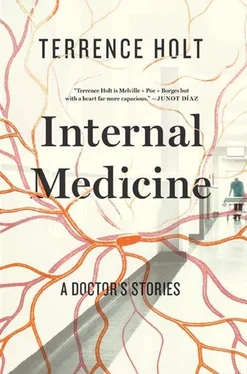Unwillingly, but helpless to do anything else, I let the car drift onto the shoulder and slow down. Beside me the traffic continued to flow on, louder now as the larger vehicles passed. My hands still gripped the wheel. If I let go, I knew they would be shaking. Sweat was pouring down my face.
I tried to concentrate. What was wrong? The pain in my belly would not let me think.
And then, as the pain grew, it twisted appallingly into something that I recognized, finally, for what it was. I was about to vomit again. Right now.
I threw open the door, registering in a fleeting moment the possibility that a passing car might shear it off, and in the next moment that I didn’t care as yet another burning flood burst out of me, splattering the concrete. A semi roared by, rocking the car, and I vomited again, and again, all coherent thought lost for the moment in the free fall of nausea.
The vomiting stopped, finally, leaving me bent over the sill, the seat belt still restraining me. I let it pull me back upright, putting my hands back on the wheel to steady everything, and took a deep breath.
And with that breath, to my surprise, returned not the panic and helplessness, but some access of rationality I had not expected.
The pain in my belly was gone. I felt lightened, not only of the mass of hot iron that had filled me a minute before, but of the dread that had grown out of it. Both were gone, both dispelled together, as if I had vomited up the fear as well.
For a moment I had an urge to look at the puddle on the pavement to see if there was anything there to explain this change, but the urge was ridiculous and I resisted. Because what was rapidly becoming clear to me, in what I was starting to understand would only be a brief respite, was that despite the relief of having vomited, I was still sick. I could feel the nausea returning, but with it came as well the welcome certainty that I was in the throes of a gastroenteritis, undoubtedly brought on by the stone-cold sausage pizza I had consumed so greedily two hours before. The presentation was classic.
As the nausea swelled again, the clarity of mind that had come to me with its cessation began to waver, filling with another surge that for a moment I almost mistook, again, for fear. And in that moment, finally, I understood what Scatliff’s urgent gaze had been trying to convey, the meaning in those painful shafts of light scratched over Carrie B’s chest films.
Joe had been right, but he had missed something as well. Scatliff’s helpless gorging on what no one else could stomach, Carrie B’s attempt to pin her own internal mystery: there was no special insight there, just another iteration of the problem. A problem, I finally realized, Joe shared, the F-Max nurse shared, I shared. Every patient in that hospital, and every staffer. Every patient and every doctor I had ever known.
It is the body that makes us crazy: our inability to interpret our corporeality, the inscrutable messages it bathes us in with every passing moment. For the patients, it wasn’t their insistence on interpreting, on trying to decode those messages, that made them mad. We are no different in this. The only thing that separates them from us, I realized, is the solutions we arrive at. Sticking needles in yourself is just crazy. But do the treatments I prescribe really make a difference? Not if the problem is mind living in a body. There is no solving that.
Our bodies: inscrutable because unmeaning. They remain the essential mystery we keep trying to solve, although sanity tells us the attempt can only end in dissolution, mind and body both.
And as for spirit? Where was spirit in all of this? Or was that only another symptom, just one more fantasy conceived by consciousness out of flesh? Just then, beside the roadway, I couldn’t say. Perhaps Joe could. I set the thought aside and gingerly, hoping the quivering in my guts had gone as far as it would go, I looked back over my shoulder and put the car in gear.
THIS IS A STORY I HEARD A FEW YEARS AGO, FROM A doctor who claimed he’d heard it from someone who was there when it was told originally. The story as I heard it raises doubts, however, as to when any original version might have been told. As to the truth of it, whatever there might have been originally, I doubt there was any left in the version that finally reached me. But as a story, the kind doctors might tell among themselves in the night when no one else is listening, it bears repeating at least one more time.
THE PHYSICIAN’S LOUNGE WAS not usually occupied at two a.m., but on this night an ice storm had begun as darkness set in; most of the on-call doctors in town had come in early and stayed. We staked out places on the sofas and chairs as we arrived, holding them jealously as the room filled. One of us — Benson, anesthesia — had arrived late, and now lay curled up in one corner of the floor, snorting intermittently. The room was lit by a single lamp, which left the far corners in shadow.
In the lounge chair next to the lamp sat Hawley, a pediatrician, and by far the oldest in the room. He had been long established in his practice when the rest of us began. Two of us had been his patients. A solo practitioner, he shared call with the two larger pediatric practices in town, which explained his presence that night, although some of us harbored a suspicion that he would have been here anyway: he was that kind of doctor, one of the old school that took its obligations more seriously than we do now, to the point of abandoning any life of his own. We were all a little in awe of him, a feeling tempered by the contempt younger doctors feel for the antiquated notions of the old.
We kept our distance from him, however, for another reason entirely. He was different. There was a tendency to produce outlandish statements bordering on a kind of clinical mysticism which made everyone uncomfortable, partly because he seemed oblivious to their effect on the rest of us. Or perhaps he was aware, and simply didn’t give a damn. In any case, he gave every indication of thinking differently from the rest of us, and, given his seniority, and the primitive reverence his patients held him in, this difference made the rest of us nervous. No one had ever caught him in a mistake, or reading a journal.
He was also fond of telling us long, apparently pointless case histories, involving patients or practitioners who had departed this scene before most of us had been born. He offered these tales (for that was what they were, and whether based on actual cases or entirely fabricated was an open question) whether we wanted to hear them or not, and with a disregard for our obvious impatience that made the entire performance intolerable: maddening because so impervious, and so benign. It seemed mean to resent this in him, and yet we all did. Not that he noticed. In telling these stories he seemed to retreat into himself, so that his involuntary audience came to feel they had been ensnared in a novel kind of meditative practice, through which the old man sought some inner meaning that had not yet revealed itself — and clearly, as far as the exasperated auditor could tell, never would.
But what was perhaps most exasperating was that bland indifference: listening to old Hawley droning on and on, whether in the hospital coffee shop or at some random nursing station, one never got the feeling that the telling was motivated by some inner doubt or turmoil. There are cases that bother you, we all knew that, the ones that leave behind names and faces that pop out at you in the night. There’s always some residue of doubt. Not with Hawley. The cases he dredged up were gruesome enough, but in telling them he seemed the embodiment of clinical equanimity. He seemed to be rehearsing the case, not in search of absolution as the rest of us would, but for some other reason entirely. It seemed — and I think this was, ultimately, why none of us could stand him — that he was telling them for our benefit.
Читать дальше












